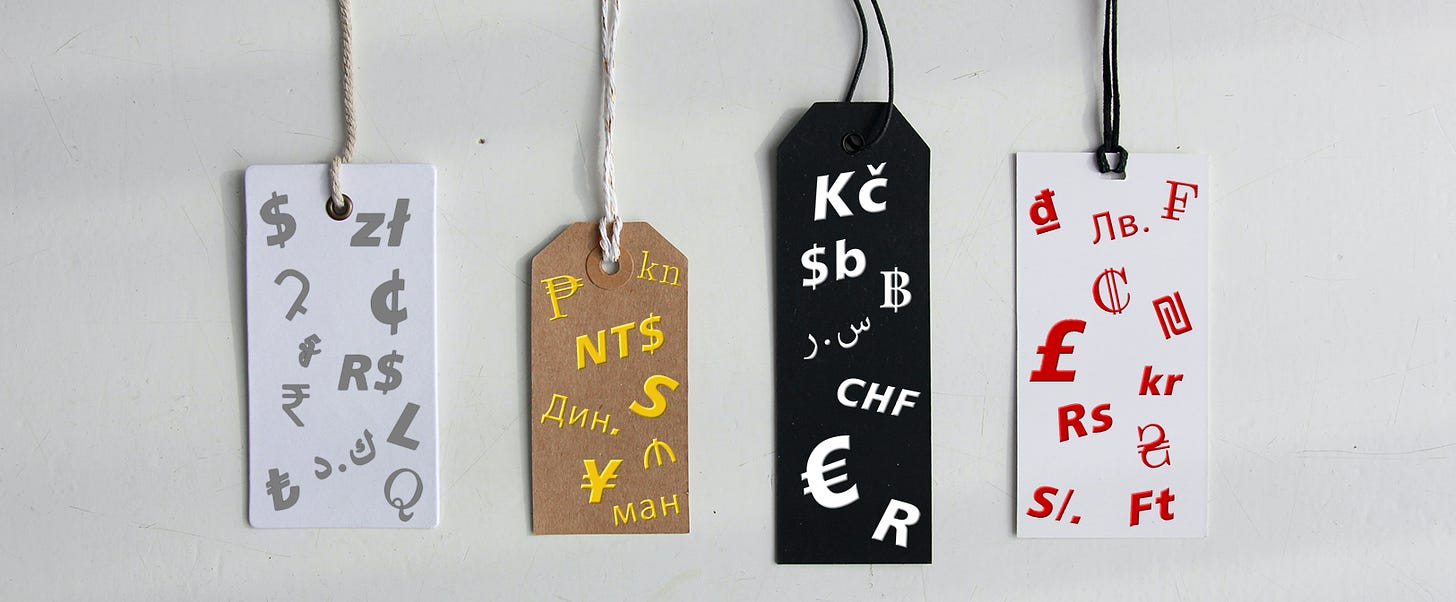Freelancing—Pricing Myself in The Open Market—Objectively Part 1
This is the first part of an opinion which is based on a question I discovered on u/Entrepreneurs, one of the Reddit threads I enjoy.
Reading time Approx. 27 min

Candour in Conversation—Food for Thought
The main purpose of discussion is to achieve completion and get in sync, which leads to decisions and/or actions. Conversations that fail to reach completion are a waste of time.
When there is an exchange of ideas, it is important to end it by stating the conclusions. If there is agreement, say it; if not, say that. Where further action has been decided, get those tasks on a to-do list, assign people to do them, and specify due dates.
Write down your conclusions, working theories, and to-do's in places that will lead to their being used as foundations for continued progress. To make sure this happens, assign someone to make sure notes are taken and follow-through occurs.
There is no reason to get angry because you still disagree. People can have a wonderful relationship and disagree about some things; you don't have to agree on everything—“Achieve Completion in Conversation” - Ray Dalio
Part I
Part I is an introduction to one problem area I have noticed when it comes to typical web development work done by freelance developers that are not based in North America. It’s not an excuse being made, but rather a discussion of feelings and perceptions that are revealed in various social media channels I have seen.
The core issue is about how developers should price themselves as non-US developers and whether they could get compensated on par with what devs in the US are asking.
Complaining or griping more about it does not really help, but it’s a good back-drop for finding potential solutions, rather than adding more wood to the fire.
Part II provides a step-by-step discussion of a tool with which we want to determine a more accurate price for web development work. It simplifies to a list of variables that can be expanded or reduced, depending on the specifics of the project.
The Reddit Post Title
Is 1k Expensive For a Full Website?
Available on u/Entrepreneurs
Interestingly, there is no explicit mention of which currency the question refers to, but thinking about it and re-scanning the thread, it’s clear we are all thinking in USD terms. It furthermore seems to show, that regardless of where other commenters are based it’s the assumed de facto currency used when evaluating international software development work.
The prices given for developing WordPress sites range from about $500 to $50k, but there is mention of custom CMS sites that went for $500k. The price spread is as diverse as the choices in international sweets are.
Although it may appear to be about pricing web development work, there’s a deeper undercurrent that shows through in the thread. It seems not to be so much about the $1k asking price as it is about who is asking the price.
The Crux of the Matter
The nut-shell version of the underlying issue seems to be about perception of what a US citizen, and in a close-call second place, an EU citizen can ask for their work vs what a Brazilian, or any other nationality is expected to ask. Options are suggested to obfuscate or hide behind US/EU business entities, which is quite common.
Other more direct approaches suggested, are to simply do good work, build a name, add value to clients’ businesses and get paid the market price, regardless of where you are based.
What is more revealing to me personally, is regardless of who or where you are, huge corporations are milking the labour force. And these corporations are based all over the globe, not just in North America.
The core issue is; freelancers are essentially getting third-grade shares for something they are funding with first-grade work.
The scales are not balanced. It’s a win-lose scenario. It’s a bad scenario.
There are even blatant comments about using developers from India, paying minimum rates and selling the products to US clients for far more than what was paid for the labour. And I’ve seen it being bragged about in other threads on Reddit and Quora. That’s blatant, it’s brutal, and it’s not cool at all.
It’s exploitation 101. And Karma’s true bitch factors are not well understood in these cases. It seldom is. The smell of green-back overpowers the smell of danger every time. The faint fragrance of decency has no chance in hell.
We continue to do things that are bad, yet we rage, pillage and burn when we feel we have been done in by another pushing into our queue at the bank.
Smoke ‘em Out
I realize arson is not only a felony, it’s also considered creepy at best. We need better light in here, you may call it whatever you like, I name it enlightenment. So, here goes, a burning match into a bush to get us seeing clearer and thinking deeper in its glow.

I am going to use a “first-world scenario” as an example, and we can have a closer look at what jumps out of our lit-up bush.
"About 60 million people in the US are doing freelance work, and are "contributing $1.3 trillion to the US economy" — (Upwork report of Dec 2021)
Punching calculators, we see that it’s equal to about $21.7k per person, per year. Not bad, not bad we can say, but let’s look a bit deeper into the now-smouldering bush we have here. Not all have slithered out just yet.
One burning question we should have, is; “How much of this $21.7k lands on the freelancer’s table?”
From Vulcanism to Hot-potatoes
First, let’s look at some Spock-logic when applied to what something is worth on the open market. And say we do this from the viewpoint of a buying customer, being it, a service or commodity getting purchased.
Then we look at some facts about the freelancing industry—as provided by the freelancing industry—via the likes of Fiverr and Upwork. These two companies are catering to the global freelancing market in general and I think we agree it would be a fair reference for pointing out where the brunt of pleasure or pain is felt, by both the sellers and buyers of said services.
Hopefully, we can muster a better insight into this industry, specifically focusing on web-development work. We can further hope to find alternative ways to handle this now-roasting potato, by looking at statistics and a pricing example, based on reality as we know it here and now.
I Reddit There
In the Reddit post, I replied to a comment that jumped out at me. The comment was about the quality of work vs ease of creating a basic website and what effort each might need. My spoiler-alert stunt did not seem to attract much attention. Clickbait doesn’t work well anymore it seems. A GOOD change in direction regarding online behaviour, I think!
The Comment:
“… The easy part is making everything work and getting the information onto the site, the hard part is making the design look good, flow, and be cohesive. I can build a basic 10-page website with optimized SEO in a few hours. A proper design that attracts customers will take me 1-2 months.”
My (trimmed) Reply:
I totally agree. Making digital business tools is not the same as making digital posters. And every business, no matter how big or small, should stop and think for a minute, preferably two. Many don't and cry about it afterwards. Educate your customers, and get them to think first…
The bottom line is:
To have tools that work in favour of the sources of the money—BOTH—the company and its clients/users…
Many people on the thread think along the same lines and—conversely, as life is—many simply say no, we ask what we want and people pay us.
Others advise; “use this not that and make bank”, some even have a metric called “The Asshole factor” which is scaled and applied depending on the client’s “level of difficulty to deal with”.
Thinking like this is not quite Vulcan-like, nor is it cooling that charring potato down so we can digest it. People are not getting fair deals this way. Not the freelancers, nor their clients.
Keeping an eye on the burning bush is not enough to ensure we don’t miss a scurrying critter or two. We need to walk around it a bit and make sure we see it from all angles. So, let’s wander to a vantage point in China and take a look from another direction.
Sidenote: No critters got burnt, singed or hurt in the making of this. They are all safe and happily chomping away at another scheme under another bush.
A Quick-Quote from China
The statements and lively discussion on the thread reminded me of a conversation I had the previous weekend with a family member. We were chatting about his procurement experiences at a ceramics manufacturing business in South Africa when sourcing raw materials from China.
His Chinese supplier said something along these lines:
“… Renny, you are educated in the skill of negotiation and always squeeze us to give you better pricing and timeframes. The Americans don’t and we always ask them for more per unit. They never argue or question it. They are more concerned about when we can deliver. So, when there is high demand, and you are paying $7 short, we are going to sell at the uncontested price first. If there’s stock left, you can get it…”
The Chinese love to do good business, they love negotiation and if you can’t get drunk with them over a business lunch so they can “inspect your true character”, they get wary. Wary is not good for business. Openness is good. Transparency is good. Trust is good.
With them, it has to be a win-win, a give-some-take-some deal. Once the business arrangement leans too much in favour of either one of the sides, they see it as bad luck. Well, that was my experience between 2005 to 2008.
The best part I remember about visiting and doing business in Fujian Province was that it was really fun to be there and get to know Chinese people, their food and green tea in their own country! A cherry on the cake was being able to get and have a good bottle of SA red wine right there too.
If you want, these friendly, polite people can arrange a small tour for you. Not tour operators, the business people you deal with when buying block-making machinery will call a friend at other factories and arrange all of it. Even offer transportation to you with a driver. A smart driver. One that speaks fluent English, enjoys your conversation, and fishes ever so delicately to find out if you are happy with what you are buying from the factory where you got picked up.
Oh! And one of the major places on our planet where all our favourite sneakers are made. And, yes, the cheap, unknown sneakers too. In the same factory. Uhm… sometimes the very same tooling is used. “We just change the material colours. Easy and chop-chop. Good for business!” You mean pirate-shoes!? “No, no! No-name shoes. Pirate shoes are bad for business.” (Counterfeit goods account for about 3.3% of global trade, and yes most of that percentage still comes from the largest manufacturer in the world.)
There’s a song … “Forever Young” I think it’s called. Alphaville, yes? But in the case of the Chinese folks, a new song is required “Forever Students” seems more appropriate. Damn, they learn! They learn hard and they learn fast!
“What does this have to do with Pricing my Software Dev work?”
No problem, please, hold my mug, let me show you the backdrop from another angle. It seems disconnected, but it isn’t. It’s about relating your work to the amount of energy put into it. And the energy is not only the direct input into the specific project you are working on.
East vs West—Round Number … How many again?
Are the Westerners going to keep up? Seen the latest figures released about the average IQ scores for countries of the world? A silly stat yes, nobody cares about IQs anymore. Apparently, it’s bad and biased for people to get measured this way. It might very well be, but ponder it for a beat or two … all things equal and with easy access to information as it stands since 2020, factual or fictional why do scientists still generate these reports then?
Strangely not a single article I have read about it (4, all US based) implies or states that people with higher IQs could well be less intelligent. All defend the lower IQ groups, stating they could well be smarter. Anyway, controversy or not, rulers are still pulled out every year and used to measure nations’ populations.
Depending on the report publisher or hosting site, the country order varies (what?), depending on the year (logical) and source (why the actual hell?). Regardless of all the discrepancies, the prevailing trend of all the ones I checked (7) puts Asia on top of Everest. And over the past five years about, every single time.
The first list I saw (lost its link), started with Moldova at an average of 90 and wound itself up to Singapore, which had the highest average score at 107-something. Guess who’s second.
If not in an arrogantly ignorant, then at least apathetically dismissive way, the West seems screwed. Where was this test developed originally? And apparently it “favours” western based cultures.
The Average IQ of Nations:
332 + 748 million @ 94 vs 1.45 billion @ 106, scary math this is!
50% @ 94’ish vs 50% @ 107’ish, hey, this doesn’t look too bad, just don’t multiply the second average by four. Simple!
How can we hustle-cook this to make it look even better? Any tips Neil Patel?
Think about it for a moment; apparently, the cleverest people on the planet are also the manufacturers of the world. Cost of decent schooling, easy-peasy cheap-cheap, let’s go study anywhere. Yeah, right!
Eh, who wants to work in a steamy sweat shop anyway, when a shady side hustle generates “big bank”?
Am I trying to insinuate any group or culture is stupid, lazy or incapable in some way? Nope, I’m not. What I am trying to say is folks, wake up start thinking harder about what really matters and do what’s right and easy, instead of doing what’s easy and wrong.
This planet will either die a horrible death or bloom into the beautiful place it can be under proper stewardship. Stop thinking another guy or gal will sort it. It’s your life, your future, and your responsibility.
Can it be done? Yes! How? We should all stop our silly shit. All of us. Simple.
OK, what is this “silly shit” you’re talking about?
You honestly don’t want to open that can here and now. Let’s move on, but remember this road marker:
What are you really scared of? Please think about it. If you want to be scared of something, be scared of yourself, and the ways you currently do most things, not your neighbours.
Back to Good Business

Pit-stop time and some think-tanking to do:
Is my asking price fair to all concerned?
What is my labour worth compared to others?
What do my customers actually need?
Should I negotiate?
Should we dilute our personal knowledge base for a few quick bucks?
Should I demonstrate integrity while selling my services and products?
Does my current way of doing things work, and work well?
So, what are your answers to the above?
Objective Subjectivity
There was another comment in the Reddit thread which caught my attention. It was removed based on self-promotion. It’s a bit sad as it was put there as an in-context reference to the discussion. But the rules of Rome are the rules of Rome, and that’s fine too.
The post was about giving two examples of custom website development work vs the $1500 price tag for each. I so wanted to reply to that “living example”! One other reader spotted it too, but most others probably simply scrolled past that gold nugget.
The poster commented that pricing web development work is subjective in their opinion. And I agree that it does seem to appear that way looking around at what people are asking and willing to pay for a wide variety of things. But is this approach sustainable and profitable to all involved? Is this good business?
The remainder of this article is the result and an attempt to go a bit deeper, and it is possible because there are two working websites, paid-for, live, income-generating business-tool examples to work with; Heron AI and LiveParcels.
It Was Written but It Wasn’t Said
A Practical Target
The targeted example I picked to use came from a Reddit poster, who mentioned that they did the abovementioned development work for clients and the asking price per site was $1500 per site. The poster also stated that the pricing is a subjective matter. Heron AI’s owners remain a bit of a mystery, looks like they might be US-based and LiveParcels is the property of a New Zealand-based business, operating in Australia.
The sites, or more accurately, web-based apps, may seem to be simple one-pagers, but many people miss the fact that there’s also a backend behind these two tools. So, the designs are not simple digital posters sitting pretty on the net, they do work, they provide value, they solve problems for clients of these companies, and they generate revenue at the same time.
The following was my prepared reply, but I decided to do it here, due to the r/Entrepreneur subreddit policies not allowing the post to remain. Well, I have to add this; although Reddit has some editing functionality, it’s not as handy and functional as what we can enjoy here on Substack.
The Were-to-Be Opening Lines
Great work, functional work, focussed work u/ecomred!
I agree prices for website development seem to be subjective, but is it?
It looks like you understand the "bottom line value parameters" of the market with the two example applications you gave. Yes, Heron AI is a one-pager, but they include the "hidden" functionality backend elements you have in there. There’s also some copywriting, graphics, and animations to name a few in there I notice. LiveParcels is more involved, has six pages, and links via an API to a feedback management site which seems template-based, so development time was saved that way, is my guess.
In reference to another comment, I made earlier in the Reddit post; The site examples you gave are business tools, small ones, but useful tools nonetheless. They are NOT digital posters or flyers cluttered by nuisance ads and other distractions.
Again; Great work! Functional work! Focussed work!
The Wall of Uncertainty
Taking the Heron AI app as a working example, let’s investigate the possibility of finding a suitable approach with which we can estimate development costs with more certainty and accuracy.

Assuming the web developer knows their development tools, it probably took about what; (A)ten to (B)fifteen days** of work to develop Heron AI? With the asking price of $1500, this puts the hourly rate roughly between (B)$12 - (A)$19 per hour. (**these estimates are founded on the more detailed analysis done in Part II)
The average web-dev salary in the US is $81k per year. Say they work their ass off, and take no leave, i.e., 52 weeks of blood-n-sweat, their gross revenue is at about $ 39 per hour. Say the developer goes with the actual average work weeks per annum in the US, which is 48 weeks, and still earns $81k per year, we are looking at approximately $42 per hour.
With the given asking price of Heron AI though, it seems to indicate the developer probably earns in the $26-$36K region if they are fully booked throughout the year. And this is The Wall of Uncertainty most of us face.
How well-booked is the average freelance developer?
At 50%-booked on average over a year, they’ll average about $8.00 per hour in gross revenue. Can the developer live with that? It's for them to know and make the call.
Should such a developer consistently churn out good work and retain clients, then things look rosier. But it's always a tricky setup to maintain the balance of servicing current clients vs taking on additional clients, so risk mitigation is an inevitable have-to.
Which Will it Be, A or B?
Ok now let's look if the train of thought is (subconscious-gut-feel-based) subjective, or maybe more (researched-fact-based) objective.
If any client has half a brain, they would:
See the value in what they are getting for their $1.5k.
However—based on popular “misinformed heresy”—argue that such a design is not worth $7k for example.
If we dare relax, become complacent, and think that future clients AND developers are not getting wiser, we are direly mistaken.
People are not as uninformed anymore, and I am referring specifically to American clients as well that used to be typically happy to pay $15k for something worth only $1.5k, and on the other side non-American developers are wising up and no longer willing to break themselves to stay afloat, while people use them on the cheap.
Oh, it’s still happening a lot, but I estimate that in about 5-7 years, probably earlier, this would be the rare exception.
What about the younger hyper-informed generations? No way in hell will customers or developers en masse, be able to keep the wool over each other’s eyes. So, we need to wake up and see the land for what it is, not what we assume, or wish it to be.
To evaluate the value of something objectively we could do well with a model of sorts. Building models are fun, but the type of model we pick should preferably be something less abstract.
The way we would typically build complex systems can become quite intricate and therefore harder to grasp and process mentally. Let's make an analogy comparing a concrete tool with a more abstract system and evaluate if it becomes easier to get a grip on and understand. Let’s see how it goes:

"A client needs a screwdriver, there are some basic specs involved about its functionality":
Should it be (A) manual or (B) electrical? = (A) Only [HTML + CSS + JS] or (B) [HTML + CSS + JS + BE Framework]
What type of materials are required for it? (A) Cheaper low-carbon or (B) high-tensile tool steel? = (A) Only [Basic Content] or (B) [Advanced media + Content + Copywriting + Analytics + SM integration]
How safe should this screwdriver be to users? = (A) [Load-and-leave WP site] or (B) [Load-maintain-backup WP site + database weekly]
In either case (A) or (B) the requirements are valid. It depends on what needs to be done and used, to create the most effective tool to suit the actual requirement while mitigating risk.
This indicates that depending on the requirements, developing these systems can for example take you from 3 days to 10 days to 100 days to 1000 days of work i.e.: $500 to $1.5k to $15k to $150k, respectively.
I think it’s pointing more to an objective fact-based approach than to subjective opinions, wouldn’t you say?
Middle-Person-Master-Gamers

Should you have seen the comments and opinions in the Reddit post, apart from the pricing spread, we would probably agree that there is a general feeling of disbelief to disappointment shining through since some developers seem to be making a lot of money while others are not, doing similar work.
It looks like a kind of "Localization Branding" is at play in there. Real quality can never be subjective.
Something either works or doesn't.
It lasts or it doesn't.
·Simple, factual, and objective.
It shouldn't have anything to do with where it was made or who made it.
Look around you, a ton-load of stuff or major parts of it, right there next to you, even those covering your butt, is by a 50-60% thumb-suck probability, made in either Asia or Central/South America.
It's subjective influences at play. Marketing psychology from the 30s is still applied because it's still valid today. Humanity has and still falls for all the tricks in the Ca$hverting and Hey Whipple, Squeeze This books.
With all the digital tools to track consumer behaviour, marketing strategies are not only running on it but betting on it every second of a 24Hr day. And if you think about it, you will realize it's betting against you, the consumer and the producer. What!? Yes, both sides are getting a combined 50-60% of the pie, and those that play with tons of smoke and a couple of psychological mirrors are taking 50-40% for playing “from the one hand to the other”. That’s a master game plan if I’ve ever seen one.
Have You Ever Heard of the HCMA?
It’s the Hitchhiker’s Consumer Mastery Algorithm and it’s the Master-Gamers’ go-to plan to leverage everything and everyone to their financial advantage. Just stock-standard human behaviour, not much wrong with that. Everybody is doing it, so it must be OK and healthy for our species’ survival, yeah?
OTMG + STBM = 42 GPLP
OTMG - Objectively Thinking Master-Gamers
STBM - Subjectively Thinking Buyers & Manufacturers/Producers
GPLP - Goldmines Per Labour Punter
Blood Stains on The Tablecloth
Before stepping away here, go have a look at what's being done with the money being placed on the tables of freelancers. Please do reference [Fiverr] and [Upwork], and do browse around on the net for reviews to learn more about the experiences of both freelancers and customers on these platforms.
I also cover freelancing in the US to demonstrate to all us “others” out there that no distinctions are being made anymore as we’d like to believe.
Here’s a brief stats summary below. But first, please swallow that coffee down. I don’t want some to go through your nose onto that new M2 of yours.
Looking at Stats – Ugh!
A Micro Summary—Upwork:
On average Freelancers working for Upwork earned $ 487.50 per month or $2.81 per hour, in 2019
“1 in 800 freelancers (0.125%) on Upwork make more than $1000 per month.” [Source]
“Upwork’s revenue from freelancers totalled $226.7 million in 2020. That’s 67.86% of total marketplace revenue.” [Source]
“The gross services volume (GSV*) measure gives us a clear picture of the total value of freelance work completed on the platform. Upwork’s GSV from freelancers totalled $2.1 billion in 2019.” [Source]
“In 2019, Upwork had 2,164,174 freelancers signed up to the platform. Getting a recent and more accurate figure for 2022 is not possible, as Upwork no longer discloses the total number of freelancers.” [Source]
In a nutshell, the figures above reduce to an average monthly GSV contribution of $487.50 per Freelancer per month or $2.81 per hour for 2019. *Remember, the GSV values represent the total turnover for that period. No expenses or fees are deducted from either the employers or the freelancers. [Source]
And the trick question for me is why stop revealing how many “employees” your business has? That’s what the freelancers effectively are in this business model.
A secondary [Source] of statistical information for the above.
A Micro Summary—Fiverr:
“The average monthly income for a freelancer on Fiverr is $103.” [Source]. That’s about ten Starbucks Tall Lattes worth more than the Upwork figure (Starbucks EU average price 2018-2020) …
Well, which developer doesn’t like coffee?
A Not-so-Micro Summary—Freelancing in the US:
It’s not vastly better in the US. As instigated at the beginning of this article, let’s revisit this report:
Basic calculation showed that if we take that $1.3 trillion (per annum)—assume no middlemen are involved—divide it by the 60 million we got the answer of almost $21.7k per year.
This reduces to an average of $10.42/hour for a full 52 weeks of work at 40 hours per week or 173.3 hours per month. No middle-man fees paid to anyone yet—simply Revenue churned divided by headcount.
If the above figures are based on a 48-week working year, well then, the picture is even worse, seeing that rent and food needs to be financed for a full year. Costs and expenses never take vacations.
Remember the question we had before about what’s actually placed on the freelancer’s dinner table?
Well, Upwork takes a cut of between 5-20% as revealed per their public information. The other freelance brokers will be on-par simply due to competition for labour.
Not a broker-using freelancer? OK, what are your true operational costs?
There are various sand-grain deductions in the freelancer’s operational gearbox which typically tends to be swept under the nearest carpet.
Let’s sweep, but leave the IRS’s dues intact. No tax man takes kindly to getting swept anywhere.
The US Federal minimum wage is $7.25 per hour (2022)
I’m going to thumb-suck and say that on average we can reduce that $10.75 per hour rate by 10-20%. This gives us in the region of $7.19 on average which lands in the US freelancer’s pocket. These thumb-suck deductions do NOT include Federal and State taxes. Those deductions are made before the Freelancer sees any revenue. Yes, it goes to middlemen and agency fees.
This is a $7.8k barn’s-width away from the lower wage range of $24.9k per year; flipping burgers and washing floors at McD’s in the US.
Oh, did I forget to mention:
The total per annum is $7.8k below the lower wage range of McDonald’s.
How about it being about $9.8k above the minimum Federal wage limit?
Sorry, my bad. Again, these are annual figures, so remember to divide by twelve to get a more tangible, monthly number. If you live from week to week, throw in a 52 instead of a 12.
To be honest, for the kind of effort and stress one has to put into developing websites, marketing yourself, taking care of client’s needs, and business admin, to name a few, I’d rather wash floors, flip burgers, listen to my iPod-vibes and have no care in the world about all the bolts and nuts involved to do software development and trying to sell myself on international street corners.
Many say they go that route to get a foot into the door. OK, their feet are in. They make some progress and some clients get to know them better and some trust is built up. Next hurdle; how many clients are going to swallow the new prices once we move away from the Master-Gamers when asking: for 2, 3, 5, or ten times more?
But, wait a minute … we say. Upwork takes a maximum of 20% for low-end priced work, and 5% for high-end priced work, so the client is not paying any higher prices! Yes, true, so let’s add 20% to a $1500 job. It means the same work will then still be sellable for $1800, implying we can get $17.87 per hour for this type of work.
Is it enough to carry you through good and bad times? Can you mitigate all of the risks involved? How about some of the risks? Is it doable?
The End Question
“Is it worth all the effort from you as an individual entrepreneur to jump through all the hoops, run the associated risks, pay between 20-5% of this monthly $ 487.50 GSV average to the vendor, then budget and cater for your own insurance, unpaid leave, operational & living costs, and still make a living?”
Ok, ok, let’s say your gig is part of that golden 0.125% going for more than $1k-per-month statistic. Forget the $487.50 version. Does it add up, even then?
I find it strange that we all, and I mean every one of us here on this page agree that One USD = $1.00. Not more, not less. So, why the hell can't we humans accept to pay AND ask for compensation on equal terms?
What is the price of XYZ-Grade fuel (unsubsidised) in every country? Exactly, it's linked to the open market value of a rusty drum of grimy crude. Not to whether you are a North American, a South American or from Asia.
If you want to drive one mile, that's what it’s going to cost you. Period. What governments do with taxes placed on top of the market values of these commodities, well that's up to each country and its citizens.
It loops back to the "Screwdriver" example:
If you want (A), then be ready to pay or ask for the value of (A). Ditto for (B)
"The needs of the many outweigh the needs of the few, or the one"—Spock
Back To The Future Marty!
There must be alternatives. Surely there has to be? Both Fiverr and Upwork state that they need more web developers. They are big, but there are thousands of similar sites out there asking for the same skills. More, more, more.
Millions of small and micro-businesses don’t have websites or web apps. They need solutions that will benefit them, not digital posters. They are out there looking for answers and solutions. Most agencies won’t touch them. They are untouched masses of gold.
Well, you are out there. The market is calling you. Go and get your slice of the pie and make sure it is as fair to both you and your client as it can get.
Dare say no to attempts of exploitation. Hard in many cases, but practice saying it—No. See, not so hard.
The more open, forthcoming, and transparent something is, the fewer reasons people can find not to invest trust in it. The trust can be positive or negative, but it won’t be luke-warm
I’m working on a solution and I’m sure at least 100k others are doing the same. Look around, you might bump into one of us. The solution is to get people to meet on neutral ground—the nice transparent kind. I’m working on it, and so can you.
Don’t Give Up—Think Before You Leap—Dive In and Swim
Part II
Part II covers the Possibilities in a Practical, tangible way of how you actually can price your work Objectively. It also includes an Excel Workbook, nothing overly fancy, but a fairly comprehensive one which takes one in a step-by-step manner to come to some revealing, factual conclusions.
If you’re not bored to death just yet, go have a look. It might change your life as a freelance web developer.
This round is on me. It’s my very first baby shown to the public, so I don’t want to assume the little kid is as beautiful and versatile as seen through my eyes. If you like its smile, well thank you. If not, I take no offence.
The next round will be similar articles, to inform, generate thought, and entertain, but mostly add value to someone else’s life. The primer parts will be free, if you want to have the deeper analysis and tools to assist you with something similar you need answers to, it’s not going to be free. This takes on average 7 working days of well-focused work. My table, like yours, needs bread.
Thank you for reading — Happy fishing — May your nets be fuller!
© Andre Du Plessis — Dragons In The Basement





